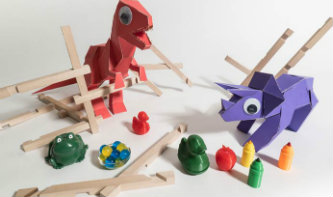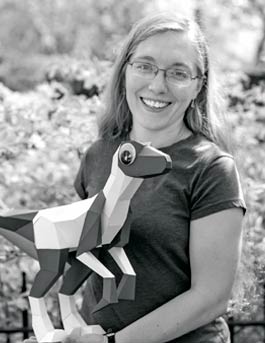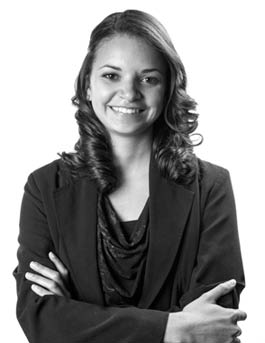Toy Stories
Lehigh proves fertile ground for new crop of toy inventors. Two exhibited their inventions in mid-February at the venerable North American International Toy Fair in New York. Video by Stephanie Veto.
When she first came to Lehigh, Lisa Glover ’13, ’14G envisioned a career in sustainable architecture, one that involved renovating old spaces and bringing them back to life. That all changed with a “Making It” homework assignment for Lehigh’s Technical Entrepreneurship master’s program.
Tasked with exploring the manufacturing process and demonstrating it uniquely, Glover drew on the origami skills she first learned as a child and created a 15-foot cardboard velociraptor. When she wore it as a costume to a Halloween party, she was a hit. People constantly asked, “How can I get one?”
Scaling it back in size to a more marketable product, Glover created KitRex—cardboard puzzle crafts that fold into colorful 3-D dinosaurs. Two successful crowdfunding campaigns followed; a third one is planned for March.
“This has been an unexpected but amazing journey for me,” said Glover, 25, who was encouraged by Lehigh professors and others to run with her idea. “This whole project has been one that I did on a whim. Other people believed in it and thought it was cool.”
Glover is among a new crop of toy inventors who developed their ideas—by accident or design as part of class assignments—while at Lehigh. All were winners in the EUREKA! Ventures Competition, a series of student entrepreneurship competitions run by Lehigh’s Baker Institute for Entrepreneurship, Creativity and Innovation. As they look to market their toys, they hope to have an impact on play, and perhaps inspire creativity or foster learning.
Glover and Briana Gardell ’14, ’15G exhibited their inventions in mid-February at the venerable North American International Toy Fair in New York, which draws buyers, manufacturers and others from around the world. Last year, they attended the show, along with Shannon Varcoe ’15 and Lauren Villaverde ’14, ’15G, with the support of alumna Alita Friedman ’87, CEO of Alita’s Brand Bar and former chief brand officer of the UglyDoll brand, for which she won the Women in Toys award and Toy of the Year.
“I was proud to bring them there,” said Friedman, who wanted the budding entrepreneurs to make connections.
What does it take to succeed in the toy industry?
“A lot of passion and a considerable amount of hard work,” said Friedman, who advises entrepreneurs to perfect their product and pricing, build relationships and develop marketing. “They also need to innovate. They need to constantly think about what’s next.”
Last year U.S. toy sales grew nearly 7 percent to $19.4 billion, according to research firm NPD Group.
E-commerce sales are growing by double digits every year, Friedman said, so sales now come from a variety of platforms including brick-and-mortar retailers, online retailers, distributors, crowdfunding, social media and more. “You can’t afford to have a void,” she said.
An established toy company might opt to buy an inventor’s product, she said. Or, a company might opt to license an inventor’s idea or design, resulting in that company handling the manufacturing and paying royalties to the inventor on every unit sold.
Given the competitiveness of the toy industry, Friedman acknowledged that it’s easy to get discouraged. “But if you are passionate about what you’re doing,” she said, “and you believe in it, no one can stand in your way.”
The Bulletin talked with the inventors about their toys—and what’s next.
KITREX
Through a widely successful Kickstarter campaign, Lisa Glover raised more than $110,000 to buy equipment and produce KitRex kits that allow customers to build their own 3-foot-long cardboard velociraptors. Last year, she launched another successful Kickstarter campaign for her pterodactyl design, which folds to have a 3-foot wingspan. A bulkier triceratops design—which folds into a 2-foot-long creation—launches next as she expands her product line.
In less than two years of production, Glover has sold her dinosaur kits to more than 4,000 customers in 49 states, 42 countries and 10 retail outlets, including Amazon.com, the Moravian Book Shop in Bethlehem and her kit-rex.com website.
“I’m hoping to get into a lot more specialty retailers,” said Glover, who had a booth in the launch pad area of the International Toy Fair in New York.
While at Lehigh, Glover won first place in the graduate student division of the EUREKA! Ventures Competition, which earned her access to Baker Institute office space at Ben Franklin TechVentures on the Mountaintop campus. She now has an office at the Bridgeworks Enterprise Center in Allentown.
She tests her kits with children to ensure that assembly of the cardboard dinosaurs is challenging, not frustrating, and as a result, has made some changes. But watching children and adults assemble her creations brings her validation. “It challenges them, and it brings them a lot of joy,” she said. “That makes me happy. It makes me feel that what I’m doing is worthwhile.”
Glover said the more she learns about the toy industry, the more she realizes that she needs to slowly build her company, Architrep, so that the business is sustainable over a long period of time, not just one or two holiday seasons. “I know I can turn this into something awesome,” she said.
Glover, who received her bachelor’s in architecture and her master’s in technical entrepreneurship, has exhibited at the National Maker Faire in Washington, D.C., and other Maker Faires in the region. This past summer, she was asked to join the National Week of Making celebration, which included her giant raptor costume being photographed on the White House lawn.
GOBLIES
When Briana Gardell spoke at Lehigh’s honors convocation in 2014, she talked about early setbacks she faced but overcame as an undergraduate, achieving a 3.96 grade point average.
“We need to remember,” Gardell said at the time, that the only people who can define “what we are capable of is ourselves. No one has a monopoly on good ideas. No one can define what is possible.”
Using her Presidential Scholarship to enroll in Lehigh’s Technical Entrepreneurship master’s program, Gardell put her words to the test. Though she dreamed of becoming an entrepreneur, she said, she had no idea what she wanted to do. Like Glover, she found inspiration and creative freedom in the program’s “Making It” assignment, creating Goblies (pronounced go-bleez)—biodegradable paint blobs that you toss like water balloons. They break on impact, creating colorful splats.
In the manufacturing assignment, Gardell had worked at replicating an egg yolk out of soap. She thought it could be interesting to make a paintball. Working through 26 prototypes, her “aha!” moment came in October 2014, a moment she captured in a phone diary post. “I think this could be my new business idea,” she wrote, with a photo of a blob in the palm of her hand.
Validation came the following month when her company, Mezzimatic, named for her grandparents, won the Joan F. & John M. Thalheimer ’55 grand prize in the 2014-15 EUREKA! Ventures Competition. The win allowed her to work out of Baker Institute office space at Ben Franklin TechVentures. Recently she received a $15,000 technology grant from the Southside Bethlehem Keystone Innovation Zone and relocated to the SoBeCoWorks collaborative space in Bethlehem.
In July, Gardell launched a successful Kickstarter campaign for Goblies Starter Kits, which contained the food-based ingredients, dyes and molds for making 100 Goblies. The science kits—refill packs are also available—contain information for young learners about the chemistry involved in making them.
“I like that it’s a fun product,” said Gardell, 23, who has a provisional patent and sells the kits on goblies.com. “It allows me to talk to a lot of people and capture their attention. It’s really great that I can utilize the toy to teach kids about science.”
Gardell, who received her bachelor’s in business information systems and her master’s in technical entrepreneurship, dreams of growing her company and expanding her product line to include glow-in-the-dark Goblies and premade Goblies. While it’s “pretty terrifying” to want to support oneself from a business, she said, she has appreciated every step of the process, adding to her resume.
“You just have to really want it,” she said, “and that makes it worthwhile.”
Stackablz
As an undergraduate in an industrial engineering class, Lauren Villaverde had problems converting two-dimensional drawings into 3-D renderings.
So when she created Stackablz 3-D puzzles for spatial development, she was hoping she’d be able to help children avoid the struggles she’s had with spatial skills—the ability to think three-dimensionally, the ability to understand how much space an object takes up in relationship to other objects.
Like fellow Lehigh toy inventors, Villaverde created Stackablz while a graduate student in the Technical Entrepreneurship program. Assigned to identify and address a problem, she first thought of developing an interactive book to help children read.
But in conferring with Robin Hojnoski, associate professor of school psychology in Lehigh’s College of Education, she learned of the lack of books to help preschoolers develop spatial skills. OK, how can I address this? Villaverde asked herself, recalling her own struggles.
That put her on a new path to discover a way to help children develop those skills and improve their performance in science, technology, engineering and mathematics (STEM) studies.
Using the 3-D printing process, Villaverde created a prototype for Stackablz, which are 3-D manipulatives composed of stackable slices that come in animal shapes, such as ducks, frogs, turtles and squirrels, as well as geometric shapes. The gender-neutral puzzles are paired with books, and children gather the slices as they read the story to put the shapes together.
“It’s an educational project,” said Villaverde, 24, who has filed a provisional patent. “This isn’t just another plastic toy. It’s something I created with a lot of thought. There’s research behind it.”
Villaverde’s project got a boost when she won first place in the graduate division of the 2014-15 EUREKA! Ventures Competition, which she said opened doors and helped her further develop her idea. The award also gave her access to Baker Institute office space at Ben Franklin TechVentures. In August, Villaverde, who received her bachelor’s in industrial engineering and her master’s in technical entrepreneurship, founded her company STEMpowered. She is now working on a manufacturing and distribution plan. “I really want to get it out as soon as I can,” said Villaverde, a featured speaker at a recent TEDxLehighRiver event.
“I really want to get it to market. That’s my goal.”
Zyx Building Sticks
In her sophomore year at Lehigh, Shannon Varcoe, 22, was taking a design class that challenged her to create a sculpture inspired by three words pulled from a hat. She drew the words “small,” “minimal” and “prop.” Varcoe had to work first with paper, then poplar, and began cutting angled grooves in the wood as part of the function of her design.
Classmates started playing with the notched pieces, as did a cousin when she brought some pieces home. That got her wondering, “Could this be something?”
Bolstered by the response to her designs, Varcoe went on to create a wooden building-block toy set that doesn’t come with any instructions. “You let your creativity tell you what to do,” she has said.
The pieces are made of unfinished natural wood and vary in length. Though seemingly simple in design, they allow users to build elaborate structures, both abstract and practical, that challenge spatial skills and creativity. In testing and developing the toy set while still an undergraduate, Varcoe watched children in play. One took the pieces and created a stool, then sat on it. Another competed with her mother to see who could build the tallest structure.
“You really can’t be bad at this,” said Varcoe, who received an Integrated Degree in Engineering, Arts and Sciences (IDEAS) and is now in Lehigh’s Technical Entrepreneurship master’s program.
At Lehigh, Varcoe chose courses that could help her in her venture. She won first place in a EUREKA! Ventures Competition social ventures category and built on her idea at the LaunchBayC summer student idea accelerator space offered through the Baker Institute at Mountaintop. She made more prototypes, experimenting with sizes, cuts and shapes.
At Mini Maker Faires (one at SteelStacks in Bethlehem, another at a Barnes & Noble), she took note of how children and adults played with the pieces, which pieces and how many they used. She took part in LehighSiliconValley, an entrepreneurship immersion program offered under the auspices of the Baker Institute. And last year, she won a Ripple Effect award in the Values and Ventures Business Plan Competition at Texas Christian University.
Varcoe has named her company TroubleMakerToys. “It’s good to be a trouble-maker,” she said, in explaining the startup’s name. “Trouble-makers become innovators. They’re the best change-makers.”
This spring, Varcoe plans a crowdfunding campaign, possibly with Kickstarter, to ask supporters for the funding she needs to get her 36-piece toy sets, which she is calling Zyx Building Sticks, into production. She is currently looking for a manufacturer and is launching a website, buildzyx.com. Though the toy sets will be aimed at children ages 6 to 12, she is looking at a possible market for adults.
“The journey,” said Varcoe, “has been really interesting.”
IncuMagic LLC
Keith Martin had to come up with 100 product ideas one summer for a creativity class in Lehigh’s Technical Entrepreneurship graduate program. A fingertip-mounted writing device was one of them.
Martin didn’t think too much of his idea—until he created a prototype for another course later that year that impressed his classmates. He did some patent research and found nothing similar.
“I figured I should go for it,” said Martin, 25, who is working for The Linde Group, a global industrial gas company, while running and raising capital for IncuMagic LLC, the company he founded while at Lehigh.
As a grad student, Martin won second place in a Michael W. Levin ’87 Advanced Technology Competition, part of the EUREKA! Ventures Competition. The prize gave him access to two teams of students in Lehigh’s Integrated Product Development course who conducted more market research and reaffirmed his findings and earned him access to Baker Institute office space at Ben Franklin TechVentures. He also was a finalist in the Licensing Executives Society’s business plan competition.
Martin sees two potential markets for the fingertip markers—one as a toy for children’s crafts and another as an adaptive device for those with disabilities who have trouble holding pens or pencils.
His company has developed, and tested, several prototypes, using 3-D printing for the colorful shells.
“I wanted to get them out there to test their functionality,” said Martin, who received his bachelor’s in materials science and engineering and his master’s in technical entrepreneurship. He found kids “had a blast” playing with the markers, putting them on each fingertip like a color wheel.
“It added a new dimension to coloring,” he said.
Martin has talked with representatives from larger companies about licensing of his fingertip markers, but he is awaiting patent approval before proceeding with further talks. His patent application encompasses various designs, including pencils, crayons and paintbrushes.
Posted on:







